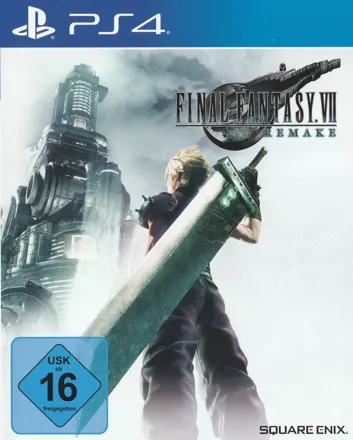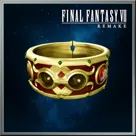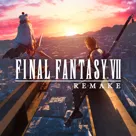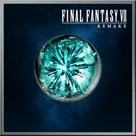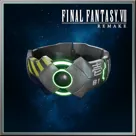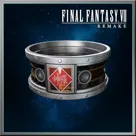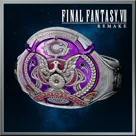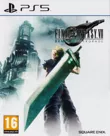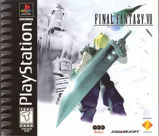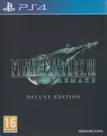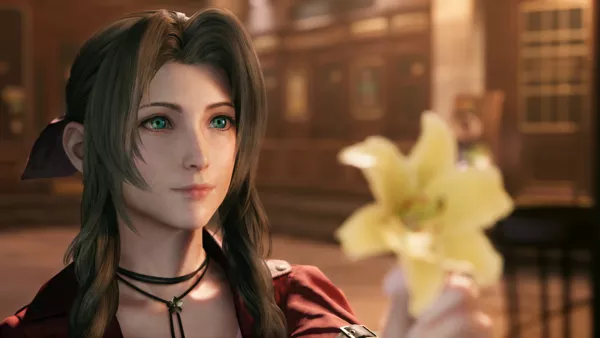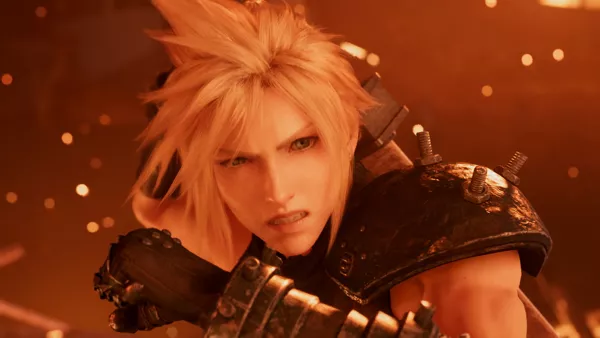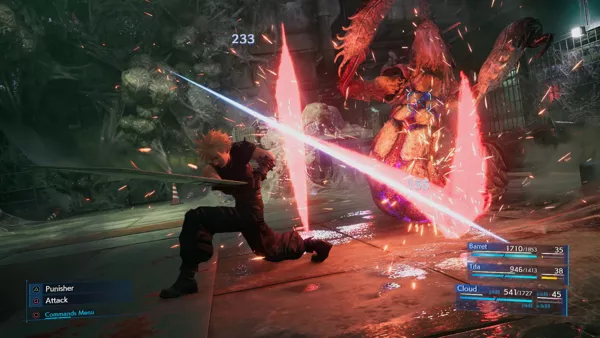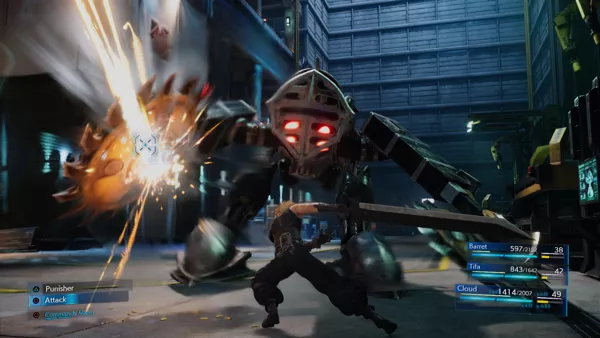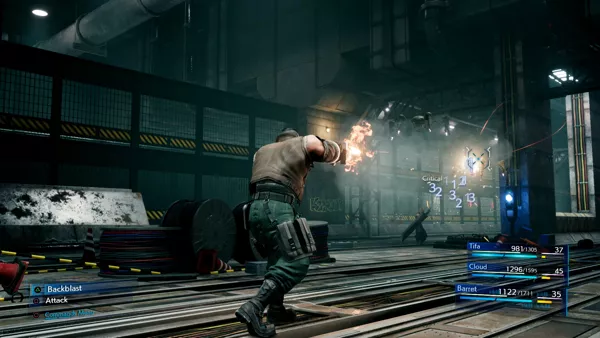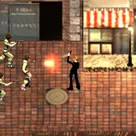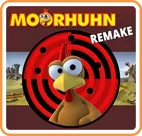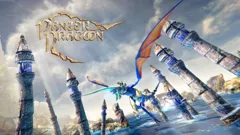Final Fantasy VII: Remake
Official Description (Ad Blurb)
The world is under the control of Shinra, a corporation controlling the planet's life force as mako energy. In the city of Midgar, Cloud Strife, former member of Shinra's elite SOLDIER unit now turned mercenary lends his aid to the Avalanche resistance group, unaware of the epic consequences that await him.
FINAL FANTASY VII REMAKE is a reimagining of the iconic original with unforgettable characters, a mind-blowing story, and epic battles.
The story of this first, standalone game in the FINAL FANTASY VII REMAKE project covers up to the party’s escape from Midgar, and goes deeper into the events occurring in Midgar than the original FINAL FANTASY VII.
1 player
DUALSHOCK®4
Software subject to license (us.playstation.com/softwarelicense). Online features require an account and are subject to terms of service and applicable privacy policy (playstationnetwork.com/terms-of-service & playstationnetwork.com/privacy-policy). One-time license fee for play on account’s designated primary PS4™ system and other PS4™ systems when signed in with that account.
FINAL FANTASY VII REMAKE © SQUARE ENIX CO., LTD. All Rights Reserved. CHARACTER DESIGN: TETSUYA NOMURA / ROBERTO FERRARI. LOGO ILLUSTRATION: © 1997 YOSHITAKA AMANO. FINAL FANTASY, SQUARE ENIX and the SQUARE ENIX logo are registered trademarks or trademarks of Square Enix Holdings Co., Ltd.
Source: PlayStation Store Description
Spellings
- ファイナルファンタジーVII リメイク - Japanese spelling
Groups +
Promos
Videos
See any errors or missing info for this game?
You can submit a correction, contribute trivia, add to a game group, add a related site or alternate title.
Credits (PlayStation 4 version)
2,369 People (2,315 developers, 54 thanks) · View all
| Director & Concept Design | |
| Co-Director (Game Design/Programming) | |
| Co-Director (Scenario Design) | |
| Story & Scenario |
|
| Music |
|
| Theme Song & Original Music Composed by |
|
| Graphics & VFX Director | |
| Battle Director | |
| Lead Application Programmer | |
| Lead Battle Programmer | |
| Environment Director | |
| Lighting Director | |
| Cutscene Director | |
| Character Modeling Director | |
| Lead Rendering Programmer | |
| Animation Director | |
| Facial Director | |
| Lead Animation Programmer | |
| Lead Technical Programmer | |
| Lead UI & Localization Programmer | |
| Lead Build Engineer | |
| Sound Director | |
| Music Supervisor | |
| Lead Dialogue Editor | |
| [ full credits ] | |
Reviews
Critics
Average score: 91% (based on 55 ratings)
Players
Average score: 4.4 out of 5 (based on 22 ratings with 1 reviews)
The Good
* Incredible graphics and cinematic presentation
-
Addictive and dynamic action-combat with turn-based elements
-
Materia system is highly flexible
-
Compelling storyline and characters
The Bad
* Only a very small portion of the original story -
Occasional bad textures and pop-in
-
Sidequests are on the basic side
The Bottom Line
The term “remake” means a lot of different things. For some, it could be a simple as slapping a shiny new coat of paint on an old game, bumping up the textures and resolution and calling it a “remaster”. For others, its a cash grab opportunity to repackage or resell the same game on a new generation of hardware. Sometimes, a game comes along which really blows open the definition of what a remake should be, and Final Fantasy VII Remake is one such game.Despite the title, this is no mere remake, it’s a reimagining. It is effectively a brand new game which utilizes the original’s story beats and characters, but also expands on them and even adds a few new elements of its own, some of which have really divided the Final Fantasy VII fanbase. The decision to split the remake up into multiple installments has infuriated some, and while the story itself is structured as a clear opening act, leaving tons of unresolved characters and plot threads, as a product it offers a full-fledged experience.
Final Fantasy VII focused on the story of Cloud Strife, a mercenary who joins up with an eco-terrorist group named AVALANCHE to fight against the Shinra corporation, a company which provides power and security for all but is slowly draining the planet of its most precious resource: mako energy. At first, Cloud is purely working with AVALANCHE solely for the money, but over the course of the game he begins to align with their cause in spite of their sometimes dogged fundamentalism and destructive tendencies, which ruin the lives of those which rely on the Mako power. Soon, however, he discovers there are larger forces at work than Shinra to save or destroy the planet, and a mysterious flower-seller named Aerith Gainsbourgh may be the key to unlocking the deeper conspiracies.
Final Fantasy VII Remake largely retells the events of the original leading up to when the player begins to explore the open world map, but it also adds a whole lot of new stuff along the way. Many of the classic characters and scenes are recreated, but some are expanded, such as the ancillary AVALANCHE members like Jesse. Even the infamous cross-dressing scene is included here, an uncomfortably suggestive moment that probably should have landed the game an M rating but somehow didn’t. Fans of the original will be very happy with how Square rebuilt and reimagined many of the original’s famous moments.
As someone who had only played a bit of the original game however, the final moments of this game are clearly more coherent to those who are already intimately familiar with the specifics of Final Fantasy VII’s plot. As an almost newcomer of the game, I was more than a little bit lost and confused as to what it all meant, and while some online searches did clear some things up this also spoiled a few plot points from the original game not in the remake that I was not yet familiar with. Many have compared this section to Kingdom Hearts and how vague and nonsensical their stories tend to get, and they’re not wrong. Still, this does leave open some interesting possibilities for the remake series going forward, but how they will address various issues will remain to be seen. I still have a lot of questions, such as which parts of Final Fantasy VII will be represented, and how will character progress transfer over to the subsequent games, if at all?
Perhaps the greatest change is in Final Fantasy VII’s combat. Instead of simply re-creating the turn-based combat system of the original, Square have instead chosen to transform it into an action-RPG, while keeping just enough elements of the classic combat intact for long-time fans. The end result is perhaps the best action-based battle system Square Enix has developed, the culmination of everything they have worked towards building over the last decades both with the Kingdom Hearts series as well as the recent Final Fantasy games such as Type-0 and Final Fantasy XV.
How it works is relatively straightforward: You’ll attack, dodge, and block just as in an action game, and successful attacks and dodges will fill a character’s ATB meter. When a section of a meter is filled, the player can open a menu while the game slows to a near-pause to use an Ability, Spell, or Item. These must be used at the correct times lest the player gets interrupted by an enemy attack. When your allies’ gauges are filled, you can issue the same commands to them as well.
Using the correct attacks and spells on an enemy will build up that enemy’s stagger meter. When this is maxed out, the enemy is stunned for a short while and attacks do much more damage, which can even be increased by certain abilities.
Each character plays very differently. Switching between allies will allow you to utilize each character’s special abilities, such as Cloud’s alternate Punisher stance for strong but slow attacks, to Barret’s Overcharge, a devastating shot which can greatly damage enemies. You’ll often be forced to switch, as characters will get stunned or bound by enemies. You can also switch to help a character build up an ATB faster, or switch to a character with more health so that enemies primarily target them instead. By the game’s end, I was constantly switching characters and utilizing nearly all of their abilities to a great extent. While it’s not as relentlessly punishing as the first Kingdom Hearts game, on the Normal difficulty it is by no means a cakewalk like the later Kingdom Hearts games, and the battles will require some strategy and learning to pull off properly, not to mention having the correct Materia equipped.
Limit breaks and summons return from the original, and are both highly useful whenever a battle gets too tense. Summons in particular work a bit differently in the remake, as they can only be used during specific fights. You cam bring in one summon for a short amount of time and use the character’s ATB bars to trigger various special attacks for the summon. At the end of the time, they will unleash their ultimate move then vanish from the battlefield.
There are a couple of small issues. First the camera can sometimes get a bit finicky especially when dealing with multiple enemies at once. Second, there is no proper jump button, and while aerial attacking isn’t too difficult, it can be a bit inconsistent as to whether or not a character will actually jump up to attack an enemy or not. Finally, some of the spells and status effects are a bit under-utilized compared to some of the others. You’ll make use of the elemental and healing spells constantly, and even the time spells have their use. However, some spells such as Subversion are extremely situational and will only be used in a handful of battles.
The main form of character customization is the Materia system, which was also featured in the original game. Essentially, throughout the game you will find or purchase different materia. These can be equipped to add new spells, augment character stats, and add new abilities. There are also special “linking” materia that when used in connected slots along with the right materia, can add various bonus effects. For example, there is a materia which can add an elemental attack to your weapon for some extra damage. These materia will individually level up as you use them, unlocking new spells or increasing their capabilities. This is a great system that provides a lot of flexibility, though in later parts of the game as characters jump in and out of your party in can be a bit tedious to constantly switch your most used materia to a new character . There are several moments of the game where you don’t even play as Cloud, but there’s also some moments near the end where you’ll swap between two parties at once.
There is also a second form of customization in the form of the Weapon Upgrade system. As you level up and complete quests, the characters will earn Skill Points, which they can use to upgrade each weapon with new materia slots or stat upgrades.
FFVII Remake is mostly structured as a linear, cinematic adventure. You’ll venture through multiple chapters with more or less one straight path and the occasional nook or cranny here and there which usually has items or other goodies stashed away. Some materia can only be acquire by going out of your way to collect them in the game world. However, there are a few chapters where the game eases back on the intensity and opens up for a bit, letting you explore some fairly sizeable hub areas, allowing you to complete various side quests, mini games, and other activities at your leisure. These side quests are pretty basic but they offer some fun character moments and more of that sweet sweet combat. I ended up doing every single one in my playthrough, and I don’t regret doing so. There are a couple of chapters which offer optional arena and VR battles to take part in, and you’re definitely going to want to do these. Some of them will unlock new summons to use while others will grant more powerful limit breaks.
In typical Square Enix and Final Fantasy fashion, Final Fantasy VII Remake makes few compromises when it comes to cinematic presentation and graphical fidelity. This game utilizes Unreal Engine 4 to the maximum effect, creating environments and characters which replicate and enhance the classic art design of the original, now in glorious HD and full 3D. Screens which were static in the old game due to PS1 limitations are now more vibrant and alive than ever. During combat, the screen gets so filled with particle effects that it can be hard to make out exactly what is happening at any given time, at least without opening the command menu. There are a couple of places where certain textures are rather substandard, but these are brief moments and don’t ruin the presentation as a while. I also noticed one particular cutscene where Cloud had the wrong sword equipped, this was a result of that particular cutscene being an FMV rather than rendered in-engine, and as soon as it ended Cloud was back with the correct weapon. The PS4 is obviously in its twilight era with the looming launch of the PS5 set for late this year, but Final Fantasy VII Remake is still an impressive showcase of the console’s capabilities, and one of the best-looking games available at the moment.
Final Fantasy VII’s soundtrack is widely considered one of the very best soundtracks in video game history, and while I wouldn’t say it is among my favorites, it does capture the Final Fantasy feeling in a way the only the older games could. Many of the songs are catchy and fit the situation well, such as the battle and town themes. The tracks have all been re-recorded for this release and sound better than the synthy bops of the original. There are also a lot of vocal pieces throughout the game, including the end credits song and several others. These really bring the soundtrack to life in a way that the older games were not capable of.
The voice acting is very cheesy and anime-style, but I don’t think Final Fantasy fans would really have it any other way. The voices are often heavily exaggerated to the point of parody, but never quite dip over.
It may only be a sliver of the original game’s storyline, but nevertheless there is a lot to unpack here. The combat is excellent, the graphics are astonishing, and the world is captivating. I’m very intrigued to see where the story ends up. More importantly, this has me wanting to play the original game so I can see the rest of Final Fantasy VII’s world. It might be set in a horrible dystopian environment, yet ironically its the perfect escape for 50 hours and counting. This is my personal game of 2020 so far.
PlayStation 4 · by krisko6 (814) · 2020
Trivia
Delay
The game was delayed from its planned release date of March 3rd 2020 to April 10th 2020.
Awards
- EGM
- December 2020 - #5 in the "EGM’s Best of 2020" list
Analytics
Related Sites +
-
Final Fantasy VII Remake: Defying Fate
A.J.'s plot analysis for the new story elements in Final Fantasy VII Remake -
Top 10 Final Fantasy VII Remake Materia
Alex discusses his picks for the best Materia in the game
Identifiers +
Contribute
Are you familiar with this game? Help document and preserve this entry in video game history! If your contribution is approved, you will earn points and be credited as a contributor.
Contributors to this Entry
Game added by Zaibatsu.
Additional contributors: Alaka, Rik Hideto, A.J. Maciejewski, Deleted.
Game added April 10, 2020. Last modified April 7, 2025.


